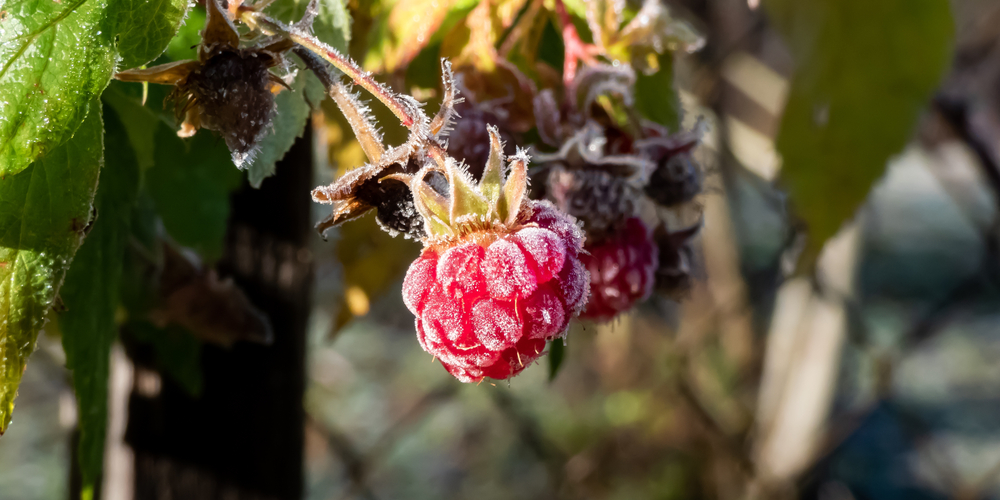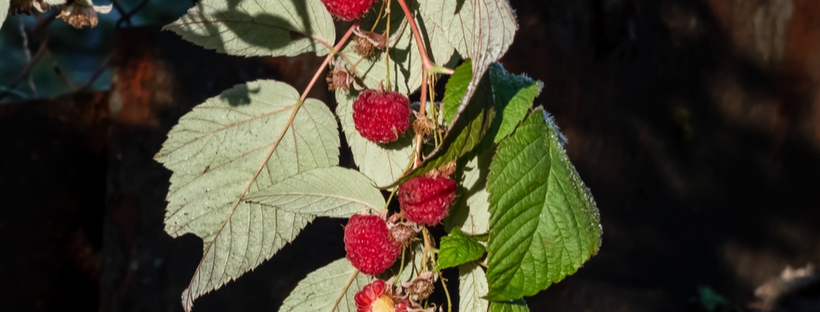Raspberries are delicious fruits that do well in any garden size (and even containers). They are one of the most popular berries in North America (and for good reasons!).
They are perfect for making jams, freezing, and eating fresh as a healthy snack. And the best part is that they are relatively easy to grow (if you know what to provide them).
But will raspberries survive frost? And what can you do to make the most out of these bushes?
You are in the right place to find out! Keep reading this essential guide to learning all you should know about raspberries and frost (and much more).
Will Raspberries Tolerate Frost?
Raspberries grow in bushes hardy to USDA zones between 4 and 9. They tend to tolerate (and do well in) cold temperatures, but unexpected frost can damage your plants, especially if it happens during the growing season.
To prevent severe issues with your raspberries, ensure you protect your shrubs from freezes. Your plants will be more susceptible to damage when blooming. Frost might kill the flowers, resulting in no fruits for that year.
Indeed, raspberries are perennial that will go dormant before hard frosts. But if low temperatures come too early, they might damage fruit buds and reduce harvests.
But generally, raspberries tolerate low temperatures and frost. So, don’t worry about your shrubs after a light freeze. For best results, make sure you pick a variety suitable to your hardiness zone: some adapt better to cold environments than others. For instance, if you live in zone 4, your best option is probably the Caroline Raspberry, which doesn’t mind rough winters.
During their first year, raspberries will probably not bear fruits. But once they establish, they can produce several hundred berries per season if you know how to take care of them.
Learn about our tips to boost harvests and minimize issues with these shrubs. Jump to the next section to find out our recommendations for growing raspberries in your garden.
Raspberries Care: Our Tips
You may not know this, but raspberries fall into two main categories: fall and summer varieties. The first produce berries on new canes, while summer raspberries develop their fruits on the previous year’s growth.
You should always check their requirements before picking one for your yard: it will make your life much easier. To maximize your harvest period, consider getting a mix of both types. Also, don’t forget that raspberries are self-fertile: you don’t need to plant more than one to get berries!
Raspberries are easy to grow but require regular pruning: make sure you eliminate dead branches to make space for new growth every year.
Doing that will also ensure your plants get adequate airflow, which minimizes the risk of diseases, attacks from pests, and fungal infections. If you are growing summer raspberries, you’ll have to prune them twice a year: in the spring and after the harvesting season.
You should consider training your bushes to grow on trellises or fences: the aesthetic results will be stunning! Doing so will also help you save some space, which might come in handy if you don’t have much room in your yard.
Besides that, you must also ensure your berries get all they need to thrive. For instance, these plants need plenty of sunshine to produce abundant harvests. But the good news is that they will keep bearing fruits even in partial shade. However, the more sunlight, the more fruits you’ll get.
Don’t forget to pay attention to the soil: it must be well-draining and fertile. If necessary, consider amending your soil pH to about 5.8 to 6.5: it will give you much better results. If you have a vegetable garden, ensure you plant your raspberries away from onions, tomatoes and potatoes: they will “suck” nutrients and threaten your plants’ development.
These veggies are susceptible to the same fungal disease: to prevent having issues with infections, ensure you plant your raspberries in different soil. Also, if necessary, ensure you protect your plants from harsh winds.
Add a thick layer of straw mulch to keep weeds at bay and retain moisture in the soil. To boost fruit production, consider fertilizing your plants. Use a balanced slow-release product: avoid selecting one too high in nitrogen: it will make your plants lush at the expense of berry production.
Related Article: Will Frost Kill Geraniums?

